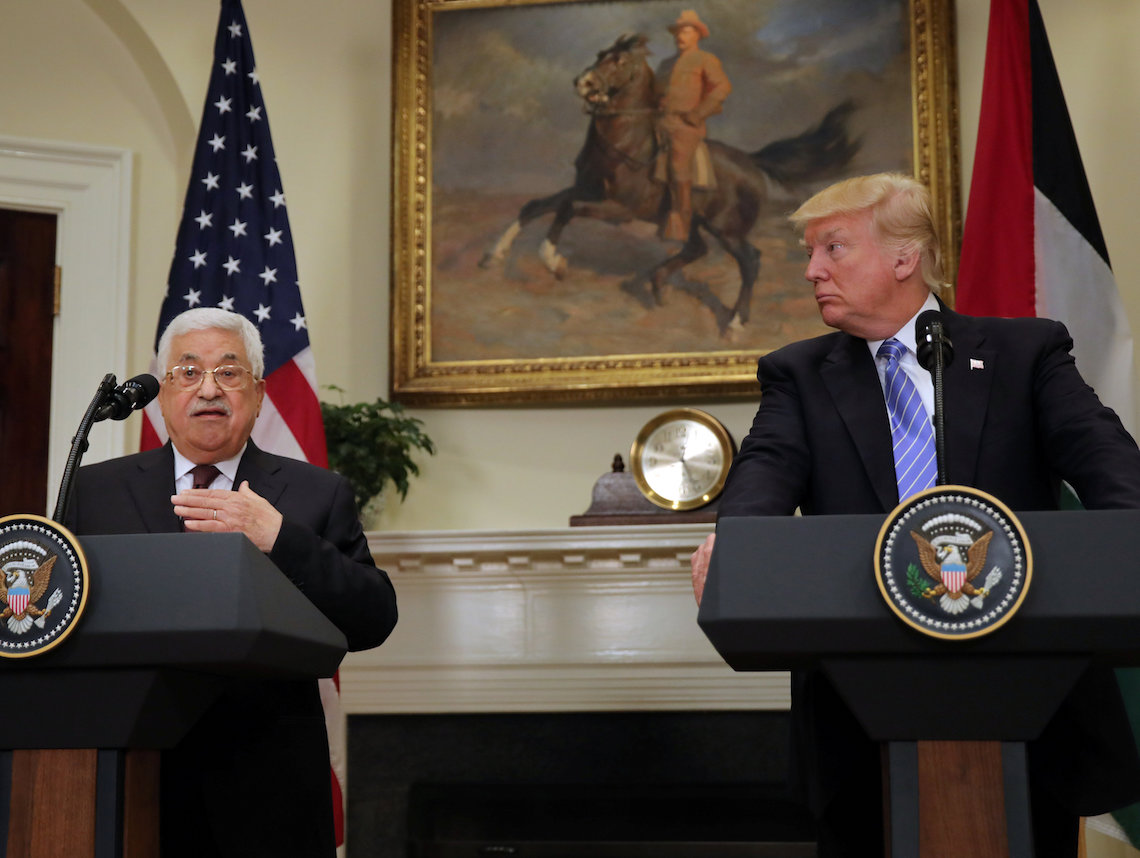 Palestinian Authority President Mahmoud Abbas and U.S. President Donald Trump at he White House on May 3. Photo by Carlos Barria/Reuters
Palestinian Authority President Mahmoud Abbas and U.S. President Donald Trump at he White House on May 3. Photo by Carlos Barria/Reuters A White House official confirmed Jewish Insider’s report on Wednesday that the Trump administration had quietly transferred an additional $20 million to Palestinian wastewater programs after the funds were frozen from an Egyptian economic aid package. “The State Department came to us and said they had identified this particular piece of money and these were, if I recall, FY2016 (Fiscal Year) funds that disappear at the end of September,” the White House official told Jewish Insider last week.
[This article originally appeared on jewishinsider.com]
However, the Trump administration source objected to an assertion made by a Congressional aide that the Trump administration was rushing to move the funds to West Bank water programs before the Taylor Force Act could be passed. Last month, the Senate Foreign Relations Committee passed the Taylor Force Act, legislation introduced by Sen. Lindsey Graham (R-SC) that would cut off all U.S. economic aid that “directly benefits” the P.A. until they cease payments to families of terrorists. “There was a particular window for this so that the money would be used. TFA (Taylor Force Act) would have no impact on this even if they passed it tomorrow. There wasn’t an ‘oh my gosh, let’s get this money before Taylor Force passes,’” the White House official added.
The official said that there were numerous Palestinian projects that the U.S. would like to support. “But when you have terrorists stabbing American citizens in the back and tax paying dollars used to support these people, the President said very clearly to President Abbas in both Washington and Bethlehem in May, this is intolerable to us,” the source emphasized.
On a separate note, the White House official declined to opine regarding an announcement from Hamas last week that the U.S. designated terror group would dissolve the Gaza administrative committee and move towards a unity government. “Our feeling is very much wait and see. There have been lots of attempts at this before,” the White House official noted. “We appreciate the Egyptians (mediation) efforts to try and come to some resolution to do this.”
After Hamas won the 2006 parliamentary elections, the Islamist party joined with Fatah to form a national unity government in March 2007. The Bush Administration condemned this Palestinian government and refused to provide it with any assistance. This policy lasted until June 2007 when Palestinian President Mahmoud Abbas dismissed the unity government following Hamas’ military coup in Gaza. Given the longstanding US policy of boycotting Hamas, any openness by the Trump administration towards the Islamist group playing some sort of internationally recognized political role is considered noteworthy.
Abbas rebuked U.S. Ambassador to Israel David Friedman during his September 20 speech at the U.N. General Assembly for referring to the “alleged occupation” of Palestinian territories. When asked if the White House agrees with Friedman regarding the “alleged occupation” or the State Department that quickly clarified its decades old policy of calling the West Bank “occupied territory,” the White House official responded, “That’s simply not my question to answer. I am going to let David (Friedman) speak to that. It wasn’t my call. My personal views aren’t really relevant. That was his statement so I would refer that to him.”
Despite some reports that the U.S. is planning a regional summit with Israel and Arab Gulf states to accelerate the peace process, the Trump administration official noted that no such meeting is currently in the works.
The White House official declined to elaborate on the timetable when the U.S. plans to present Israelis and Palestinians with its peace plan or if there have been any concrete advancements towards peace during talks with Netanyahu or Abbas.
Asked what options the administration was considering, in light of the President’s unwillingness to exclusively back a two state solution, the White House official explained, “It goes back to the other question. The President said one state or two states: it’s for the two parties to agree on. It’s not for us to say: here are your options.”
Lavishing praise on Netanyahu’s UN address, the White House source explained, “It was a very strong speech. Obviously, the President appreciated the strong expression of support. It doesn’t make us unhappy to have the Prime Minister of Israel very pleased with President Trump’s speech and perhaps the Venezuelans, Iranians and North Koreans less so. It draws a very clear contrast between the leaders of other countries. I thought the very positive message this year about what Israel offers the world was extremely valuable.”






















 More news and opinions than at a Shabbat dinner, right in your inbox.
More news and opinions than at a Shabbat dinner, right in your inbox.